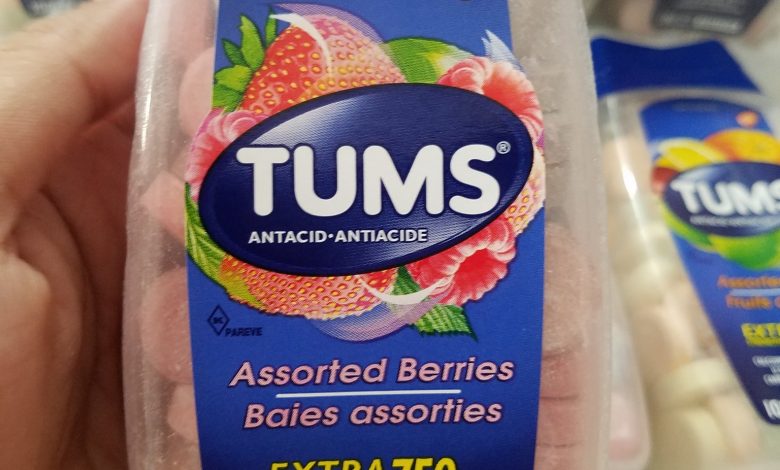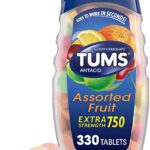Do Tums Help With Diarrhea?

What is diarrhea?
Going to the bathroom, having a bowel movement, pooping – no matter what you call it, stool is a regular part of your life. However, sometimes this process of getting waste out of your body changes. When you have loose or watery stool, it’s called diarrhea. This is a very common condition and usually resolves without intervention.
Diarrhea can happen for a wide variety of reasons and it usually goes away on its own in one to three days. When you have diarrhea, you may need to quickly run to the bathroom with urgency and this may happen more frequently than normal. You may also feel bloated, have lower abdominal cramping, and sometimes experience nausea.
Although most cases of diarrhea are self-limited (happening for a fixed amount of time and steady level of severity), sometimes diarrhea can lead to serious complications. Diarrhea can cause dehydration (when your body loses large amounts of water), electrolyte imbalance (loss of sodium, potassium, and magnesium that play a key role in vital bodily functions), and kidney failure (not enough blood/fluid is supplied to the kidneys). When you have diarrhea, you lose water and electrolytes along with stool. You need to drink plenty of fluids to replace what’s lost. Dehydration can become serious if it fails to resolve (get better), worsens, and is not addressed adequately.
Globally, an estimated 2 billion cases of diarrheal disease occur each year. Also, around 1.9 million children under the age of 5 years — mostly in developing countries — die from diarrhea every year. This makes it the second leading cause of death in this age group.
What is Tums?
Tums is an antacid made of sucrose (sugar) and calcium carbonate (CaCO3) manufactured by GlaxoSmithKline in St. Louis, Missouri, US. They are also available in a sugar-free version. It is an over-the-counter drug, available at many retail stores, including drug stores, grocery stores, and mass merchandisers. It provides relief from heartburn and indigestion (“sour stomach”).
Antacids are typically safe for most people. However, people with certain medical conditions should talk with their doctors before taking certain antacids that contain aluminum hydroxide and magnesium carbonate.
For example, people with heart failure may have sodium restrictions to help decrease fluid buildup. However, antacids often contain a lot of sodium. These people should ask their doctor before using antacids.
People with kidney failure may develop a buildup of aluminum after using antacids. This can lead to aluminum toxicity. People with kidney failure also tend to have problems with electrolyte balance. All antacids contain electrolytes, which could make electrolyte balance problems worse.
Talk to your child’s doctor before giving your child antacids. Children don’t typically develop symptoms of excess stomach acid, so their symptoms could be related to another condition.
Do Tums Help With Diarrhea?
No, Tums contain Calcium Carbonate USP 750mg as an active ingredient which may increase the incidence of constipation, severe diarrhea, and abdominal pain. Calcium carbonate is more often associated with gastrointestinal side effects, including constipation, flatulence, and bloating.
How can I treat my acute diarrhea?
In most cases, you can treat your acute diarrhea with over-the-counter medicines such as loperamide (Imodium) and bismuth subsalicylate (Pepto-Bismol, Kaopectate). Doctors generally do not recommend using over-the-counter medicines for people who have bloody stools or fever—signs of infection with bacteria or parasites. If your diarrhea lasts more than 2 days, see a doctor right away.
In most cases, you can treat acute diarrhea with over-the-counter medicines. When you have acute diarrhea, you may lose your appetite for a short time. When your appetite returns, you can go back to eating your normal diet. Learn more about eating when you have diarrhea.
How can I treat my child’s acute diarrhea?
Over-the-counter medicines to treat acute diarrhea in adults can be dangerous for infants, toddlers, and young children. Talk to a doctor before giving your child an over-the-counter medicine. If your child’s diarrhea lasts more than 24 hours, see a doctor right away. You can give your child his or her usual age-appropriate diet. You can give your infant breast milk or formula as usual.
How do doctors treat persistent and chronic diarrhea?
How doctors treat persistent and chronic diarrhea depends on the cause. Doctors may prescribe antibiotics and medicines that target parasites to treat bacterial or parasitic infections. Doctors may also prescribe medicines to treat some of the conditions that cause chronic diarrhea, such as Crohn’s disease, irritable bowel syndrome, or ulcerative colitis. How doctors treat chronic diarrhea in children also depends on the cause.
Doctors may recommend probiotics. Probiotics are live microorganisms, most often bacteria, that are similar to microorganisms you normally have in your digestive tract. Researchers are still studying the use of probiotics to treat diarrhea.
For safety reasons, talk with your doctor before using probiotics or any other complementary or alternative medicines or practices. If your doctor recommends probiotics, talk with him or her about how much probiotics you should take and for how long.





